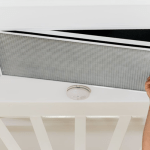
Did you know that most Americans have some form of hard water in their homes?
While you’ve probably heard of hard water and soft water before, you may not actually know whether you have hard or soft water in your home. What’s the difference between hard vs soft water, and which type of water is best?
Read on to learn the differences between these two types of water and to understand the benefits of each.
Hard Water
Hard water has higher concentrations of calcium and magnesium than soft water. These minerals are not toxic and are actually both essential nutrients in a balanced diet.
One of the major benefits of hard water is that drinking it can help you intake appropriate levels of calcium and magnesium. However, these minerals are not ideal for cleaning, as they can leave mineral deposits on your appliances and dishes and may damage other belongings.
Soft Water
Soft water has very low levels of magnesium, calcium, and other minerals in comparison to hard water. Because of this, soft water’s major chemical component is sodium, which means that it can taste almost salty.
The major benefit of having soft water in your home is that it is easier to clean things with than hard water. The downside is that it often does not taste as good to drink as hard water.
How Do I Tell if I Have Hard or Soft Water?
If you have hard water, your dishes and your hands may feel scummy or filmy after washing them. You may also see spots on your dishes and mineral stains on your clothes.
If your home was built in the mid-20th century and you have hard water, you might notice that you have mineral buildup on the inside of your water pipes. Regardless of the age of your home, hard water can also dry out your skin and hair.
Soft water will do none of the above. It may also have a little bit of a salty taste, but not enough to affect the quality of the drinking water.
If you want to be sure of which kind of water you have and are curious about exactly the concentration of chemicals in your water supply, home testing kits are inexpensive and easy to use.
Which Is Better?
It depends on what your primary use for your water is!
Hard water generally tastes better for drinking than soft water. Drinking it also helps you to get your daily recommended intake of calcium and magnesium.
However, if your clothes are getting damaged or if you’re having to wash your dishes multiple times, you may need to soften your water, regardless of how it affects the taste. Installing a hard water bullet or other home water softener could be the solution you need.
If you have high blood pressure, you may not want to soften your water, as this can increase your sodium intake without you knowing. Some water softening systems use potassium instead of sodium, and this could also be a good option for you. You could also use your tap water exclusively for washing and cleaning and purchase bottled water for drinking.
Choose the Water That’s Best for You
Now you know how to tell whether you have hard or soft water in your home. If you’re interested in softening your water, you can install a water filtration system in your home and get softer water today.
Looking for more tips on home improvement? Check out the other articles on our blog!






